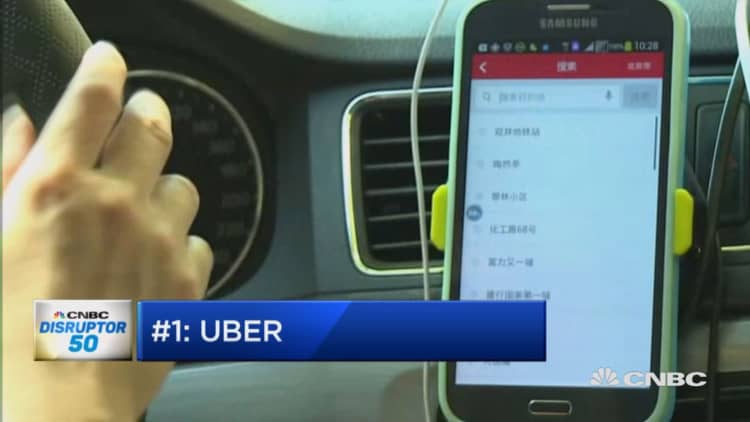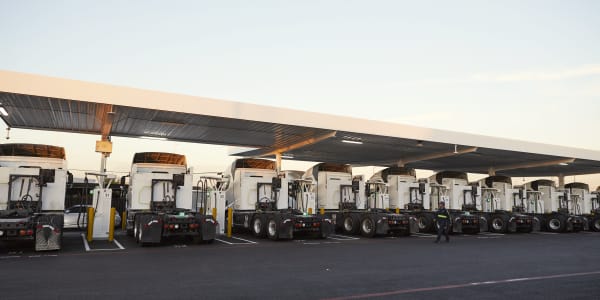
If you want a snapshot of the state of the tech bubble in Silicon Valley, take a look at the 2016 CNBC Disruptor 50 list. The fourth annual ranking profiles the most innovative private companies in the world that are shaking up industries and causing major paradigm shifts that affect every corner of society (see methodology here). This year 28 of the total are Silicon Valley upstarts. The rest are from other U.S. cities, and five are found abroad.
The list reveals that private top-tier companies in a wide variety of sectors — including cloud computing, biotech, transportation and aerospace — are still raising huge sums of cash that are boosting valuations to the stratosphere. Despite a cooling off in the venture capital industry and IPO market, they are a magnet for investors.
How big these private companies are, and the exponential pace of their growth, is staggering. "The median age of the Disruptors is just seven years," revealed Adley Bowden, vice president of PitchBook. "Yet they have made such an impact so fast, considering many have become household names."
Numbers tell the story. They have raised a stunning $41 billion in venture capital at a combined valuation of $242 billion, according to PitchBook. And a dozen of these companies snared $1 billion or more. The median amount of venture capital raised: $276 million.
Uber, perched atop the list, raised $12.5 billion from venture heavyweights and others, pushing its valuation to $66 billion. Airbnb, No. 2, garnered $2.5 billion, while Palantir Technologies, No. 4, raised $2.7 billion.
For these disruptive ventures that now have a median valuation of $2 billion, the surge in capital pouring in has been rocket fuel for growth. Besides traditional venture capitalists like Kleiner, Perkins, Caufield and Byers and Andreessen Horowitz, mutual fund investors entered the fray. Fidelity invested in 13 of the Disruptors including Snapchat, the popular teen app, Uber, Airbnb, Twilio, Oscar and SpaceX. And once again Google Ventures was a dominant player that invested in a dozen of this year's tech companies.
Foreign investors also placed their bets on Disruptors. Last week Uber raised $3.5 billion from Saudi Arabia's Public Investment Fund, aligning the company with a major market in the Middle East it plans to target for expansion. Snapchat, No. 16, raised $200 million from the Chinese e-commerce giant Alibaba as part of a $1.8 billion round of financing in May.
This comes at a time when venture funding has cooled. Over the last two quarters, venture capital funding rounds in the United States has fallen, according to PitchBook. In the first quarter of this year, the number of deals dropped 12 percent, to 1,810 totaling $17.7 billion.
The most robust sector of the market is in late-stage financing, where companies with well-established business models are raising expansion capital to build far-flung empires before they hit the trigger to go public. During the first quarter of 2016, 388 companies raised $9.43 billion, PitchBook data revealed.
"There is no curb in enthusiasm by investors in emerging tech start-ups with high growth potential," said Matt Glickman, a lecturer in entrepreneurship at Stanford Business School who served on this year's CNBC Disruptor Advisory Council. "VCs and entrepreneurs in the Valley are more cautious, but I do not see a slowdown in the flow of funds chasing promising deals. I actually see more start-ups emerging."
"We're trying to find long-term winners," said Andrew Boyd, head of global equity capital markets who oversees private investment for Fidelity. He believes that never before have private companies disrupted as much as they are doing now, impacting the global economy in ways never imaginable.
The go-go era, however, may be at an inflection point. Eventually, there will be a culling, Glickman points out, as some unicorns are exposed as not having solid economics. "Already there is a bit of froth in the market, and we are seeing some of it blow off now. But at the same time, we are still seeing many fundamentally strong companies being created now."
For these darlings, Glickman predicts the IPO window will remain open. Twilio, No. 39, on the 2016 CNBC Disruptor list is an example of such a company testing the waters. In late May the company, which makes a cloud communications platform, filed an S-1 to raise $100 million in an IPO on the NYSE during a dead period for IPOs. In its registration statement it revealed that it brought in $167 million in revenue last year but had a net loss of $35 million.
This pattern follows historic trends. Since the CNBC Disruptor 50 list launched in 2013, 10 companies from the list went public, including Etsy, Twitter, Square, Lending Club and Pure Storage.
"For these elite companies that are busy disrupting markets around the world, going public is not always the best option," PitchBook's Bowden said. "Many are opting to stay private longer, since funding is available."
This is a broad-based trend in the marketplace. Private companies are growing larger and staying private longer. According to the National Venture Capital Association, the average length of time before a start-up goes public has nearly doubled in the last two decades, from 3.5 years in 1995 to 6.6 years in 2015.











